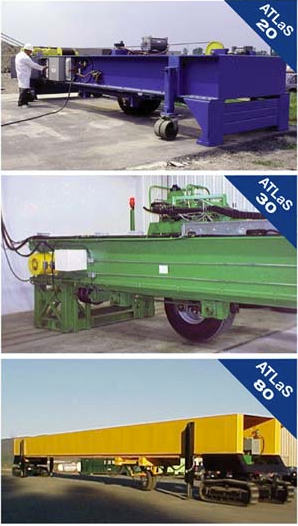Looking for custom pavement or bridge load testing equipment?
Pavement and bridge load testing has been in our sweet-spot for over 20 years. While Vertek specializes in CPT equipment manufacturing, our geotechnical engineering experience extends into many other arenas. We’ve been pioneering the science of accelerated pavement and bridge load testing apparatus. We call this offering the Accelerated Transportation Loading System (ATLaS).
These systems reduce the time and effort required to gain data regarding the lifespan and limits of road surfaces by simulating many years of traffic loading in months and are primarily sold to state DOTs and research universities.
More than 20 years of pavement testing.
Since our first ATLaS delivery in 1997 to Ohio University, ARA has delivered six platforms to research institutes across North America.
Our 70,000 square foot ISO certified manufacturing facility in Randolph, Vermont is home to experienced engineers, designers, and technicians with decades of experience in geotechnical fields.

All of our platforms are custom built to accommodate for weight capacities, budget constraints and site restrictions.
Vertek built ATLaS have been delivered to:
- Université Laval
- Louisiana State University
- Montana State University (Bridge Deck Tester)
- University of Illinois
- Ohio University
- Gas Technology Institute, Illinois
- Currently building for Rutgers University
The system can be built to test a variety of pavement and bridge load types based on customer specifications. These tend to be based on typical maximum load. The below graphic details these options.
Available options

- Wheel wander
- Environmental controls (temperature cycling, freeze-thaw cycles)
- Braking
- Tire pressure control
- Tire type (dual, single, full dolly)
- Automated testing
- Remote monitoring
- Portability
- Unidirectional Loading
- Bidirectional Loading
- Service Agreements
The output of the ATLaS allows agencies to evaluate materials, designs, and techniques in a controlled environment in order to inform road and bridge construction and maintenance decision making.
A standard one year warranty and support package are included with all deliveries. Additional support contracts are often desired and we currently provide such services in foreign and domestic markets.
These are inclusive of training, updates, repairs, maintenance, and on-call support via toll-free telephone and email.
Pavement and bridge load testing FAQs
What is a bridge structure?
A bridge structure is built to span a physical impediment, such as a body of road, valley, or water. It is constructed to provide a way over the obstacle, usually something otherwise difficult or impossible to cross.
What is pavement and bridge load testing?
Bridges are under various loads and environmental impacts that cause them to lose their structural integrity. Nondestructive load testing is a practical approach to measuring the structural response of a bridge under various loading conditions and determining its structural integrity.
What are the three types of loads that must be considered in bridge construction?
Structural engineers consider three main types of loads:
1. Dead loads.
2. Live loads.
3. Environmental loads: Dead loads include the weight of the bridge itself plus any other permanent object affixed to the bridge, such as toll booths, highway signs, guardrails, gates, or a concrete road surface.
How are bridges tested for safety?
Pavement and bridge load testing is a practice as old as bridge engineering. In the past, load testing was used upon opening a newly-built bridge to show the traveling public that this structure is safe for use. Over time, engineers have developed different practices for load testing.
Interested in learning more?
Click here or give us a call at 1-800-639-6315 to discuss your needs and our solutions.
Get the Vertek Product Catalog
Work with the world leader in the development and manufacturing of advanced in-situ soil testing apparatus.